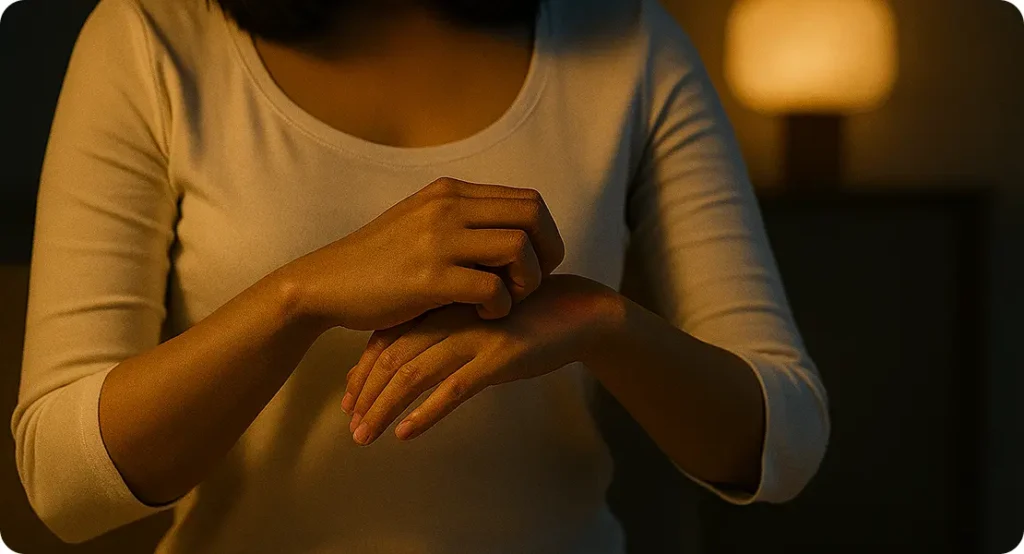Few things are as frustrating as lying in bed, ready to sleep, only to find yourself scratching constantly. Itchy skin at night known medically as nocturnal pruritus can make it almost impossible to relax or get a good night’s rest.
You’re not imagining it. Many people find that itching tends to get worse at night, even if their skin feels fine during the day. The reasons vary from dryness and eczema to the body’s natural rhythm and increased skin sensitivity after dark.
In this article, we’ll explore why your skin might feel itchier at night, what medical and lifestyle factors could be to blame, and the best ways to get relief including treatments recommended by a dermatologist.
Why Does Itching Feel Worse at Night?
Your body doesn’t behave the same way 24 hours a day. In the evening, several biological changes happen that can make your skin more prone to itching.
Here’s what’s going on:
- Temperature fluctuations: Your body temperature rises slightly in the evening, which increases blood flow and skin sensitivity.
- Reduced distractions: At night, there’s nothing to distract you from the itching, so you notice it more.
- Circadian rhythm changes: Hormones that regulate inflammation and skin repair change during sleep, influencing itch perception.
In short, your body’s natural rhythm may be amplifying sensations that were easy to ignore during the day.
1. Dry Skin (Xerosis)
One of the most common causes of nighttime itching is simple dryness.
Your skin loses moisture naturally throughout the day. In the evening, oil production decreases, leaving skin less protected. Central heating, air conditioning, or cold weather can make this worse.
Signs of dry skin include:
- Tightness after showering.
- Flaking or rough texture.
- Fine cracks or scales.
How to help:
- Apply a thick, fragrance-free moisturiser before bed.
- Avoid hot showers warm water is better for maintaining skin oils.
- Use a humidifier to add moisture to your bedroom air.
2. Eczema and Dermatitis
If your skin condition flares up more at night, you’re not alone. Eczema (atopic dermatitis) is particularly known for evening itch.
During the night, the body’s cortisol levels drop. Cortisol is a natural anti-inflammatory hormone, so lower levels mean more inflammation and itching.
Scratching during sleep can make eczema worse, often leading to:
- Red, inflamed patches.
- Oozing or crusting.
- Thickened skin from repeated scratching.
What helps:
- Apply emollients generously before bed.
- Wear breathable cotton pyjamas.
- Keep nails trimmed short to avoid breaking the skin.
- For persistent symptoms, speak to a dermatologist about medicated creams or antihistamines.
3. Allergies and Irritants
Sometimes, it’s not your skin that’s the problem it’s your environment.
Common nighttime irritants include:
- Laundry detergent residue on bedding.
- Fabric softeners or fragranced sheets.
- Dust mites, especially in older mattresses and pillows.
Allergies to pet dander or mould can also worsen at night if you share a room with animals or have poor ventilation.
How to help:
- Wash bedding weekly in hot water to kill dust mites.
- Use hypoallergenic laundry products.
- Keep pets off the bed if you’re sensitive.
- Consider replacing old pillows or mattresses.
4. Histamine Levels Rise at Night

Histamine is a chemical your body releases during allergic reactions and as part of your immune response. Interestingly, your histamine levels naturally increase at night, even without allergies.
This can make skin feel itchier and more reactive. People with conditions like eczema or hives (urticaria) tend to notice this effect more.
What helps:
- Take non-drowsy antihistamines during the day if advised.
- For severe night-time itching, your doctor may recommend a sedating antihistamine before bed.
5. Psoriasis
Psoriasis can also worsen at night. The reason is partly hormonal and partly due to inflammation cycles.
Because cortisol levels dip in the evening, inflammation in psoriasis tends to become more active. You might also notice:
- Burning or stinging sensations.
- Raised red plaques.
- Silvery scales.
Tips for relief:
- Use prescribed creams regularly, even on days when your skin looks better.
- Moisturise multiple times a day.
- Avoid heavy blankets or fabrics that overheat your skin.
If psoriasis keeps you awake regularly, consult a dermatologist for tailored management options.
6. Liver or Kidney Conditions
While rare, internal medical conditions can cause nighttime itching. The most common are:
- Liver problems such as cholestasis (bile flow obstruction).
- Kidney disease, where toxins build up in the bloodstream.
In these cases, itching is usually widespread and not linked to visible rashes. It may also worsen in the evening because of how the body processes certain chemicals at night.
If you notice persistent itching without any skin changes, it’s important to see your GP or a dermatologist for testing.
7. Hormonal Changes
Hormones can play a surprising role in nighttime itching. During menopause, for example, lower oestrogen levels reduce skin moisture and collagen production. The result? Dry, itchy, and sometimes burning skin.
Pregnancy can also cause temporary itchiness due to hormonal changes and increased blood flow.
Keeping your skin hydrated and avoiding heat can help reduce these symptoms.
8. Medications
Certain medications can trigger or worsen itching, particularly when taken at night. Examples include:
- Painkillers such as opioids.
- Blood pressure medications.
- Antibiotics or antifungal drugs.
If your itching began after starting a new medication, discuss this with your doctor before stopping any prescribed treatment.
9. Stress and Anxiety
Stress doesn’t just affect your mind it shows up on your skin too. Emotional stress can trigger the release of inflammatory chemicals and histamines, leading to itching.
At night, when your mind is quieter, those stress-related sensations can feel even stronger.
How to help:
- Try deep breathing or relaxation exercises before bed.
- Limit caffeine and screens in the evening.
- Keep your bedroom cool, calm, and clutter-free.
When to See a Dermatologist

Occasional itching at night is quite common and usually nothing to worry about. Many people experience mild irritation before bedtime, often due to dry skin, minor allergies, or environmental factors like bedding materials or room temperature. However, if this itching happens frequently, lasts for more than a couple of weeks, or starts affecting your ability to sleep and function during the day, it’s important to seek professional advice.
You should see a dermatologist if:
- The itch lasts longer than two weeks.
- You see signs of infection (redness, swelling, pain, oozing).
- The itching is severe enough to disturb sleep regularly.
- You notice yellowing of your skin or eyes (possible liver issue).
- Over-the-counter remedies aren’t helping.
A dermatologist can perform a thorough examination, including checking for underlying skin conditions, identifying potential allergies, or evaluating internal health issues that may be contributing to your symptoms. They can then recommend a personalised treatment plan tailored to your needs, which may include prescription medications, lifestyle adjustments, or specialised skincare routines.
Getting expert advice early can help prevent the itch from becoming chronic and improve your overall comfort, skin health, and quality of sleep.
Tips for Managing Night-Time Itching
While you’re waiting to see a specialist, these practical steps can make nights more comfortable:
- Cool the skin: A damp, cool compress can calm irritation.
- Avoid scratching: Try patting or applying pressure instead.
- Use soothing skincare: Look for ingredients like ceramides, oat extract, or aloe vera.
- Wear light cotton clothing: Avoid wool or synthetic fabrics.
- Adjust room temperature: Cooler rooms reduce itching sensations.
- Stay consistent with moisturiser: Apply within three minutes of showering to lock in hydration.
- Limit hot baths: They strip away protective skin oils.
Over-the-Counter Relief Options
For mild or occasional nighttime itching, there are several over-the-counter (OTC) treatments that can help manage discomfort and improve sleep. While these options are often effective for short-term relief, it’s important to monitor your symptoms and seek professional advice if they persist.
- Emollient creams and ointments: These products work by restoring and locking in moisture to dry skin, which is a common trigger for itching. Applying an emollient regularly, especially after bathing, can help reduce irritation and soothe sensitive areas. Look for creams that are fragrance-free and designed for sensitive skin to minimise the risk of further irritation.
- Antihistamines: Oral antihistamines can be particularly helpful if your nighttime itch is related to allergies, such as dust mites, pet dander, or pollen. They work by reducing the body’s histamine response, which can lessen both itching and inflammation. Some antihistamines also have a mild sedative effect, which may help improve sleep, but it’s important to follow dosing instructions carefully.
- Hydrocortisone cream: Mild steroid creams like hydrocortisone can be applied to inflamed or itchy patches for short-term relief. They help reduce redness, swelling, and irritation, but should not be used continuously for extended periods without medical guidance. Overuse can thin the skin or cause other side effects, so it’s best reserved for flare-ups or particularly bothersome areas.
While OTC treatments can be effective for temporary relief, they are not a substitute for professional care if the itching persists. If you find that your symptoms do not improve after a week or two of consistent use, it’s time to consult a dermatologist. Persistent itching may indicate an underlying skin condition, allergy, or other health issue that requires a personalised approach and potentially stronger prescription treatments.
By combining OTC measures with good skincare practices—like keeping skin moisturised, avoiding harsh soaps, and maintaining a comfortable sleep environment—you can often reduce mild itching and improve comfort at night.
Medical Treatments
For persistent or severe nighttime itching, your dermatologist might recommend:
- Prescription steroid creams to control inflammation.
- Light therapy (phototherapy) for conditions like eczema or psoriasis.
- Stronger antihistamines or immune-modulating medications.
- Treatment of underlying causes, such as liver or kidney issues.
Addressing the root cause is always the key to lasting relief.
Why Professional Diagnosis Matters
Itchy skin at night can be a symptom of dozens of possible conditions from eczema and allergies to thyroid disorders or medication reactions. Self-treating without knowing the cause can make things worse.
A professional dermatologist will examine your skin, take a full history, and run any necessary tests to uncover the cause. With that information, they can create a plan that targets the source, not just the symptoms.
FAQs:
1. Why does my skin itch more at night even though it seems fine during the day?
Night-time itching, or nocturnal pruritus, is influenced by several biological and environmental factors. Your body temperature naturally rises in the evening, which increases blood flow and skin sensitivity, making even mild irritation feel stronger. Hormonal changes, especially a drop in cortisol levels, reduce the body’s natural anti-inflammatory effects at night. Additionally, the quiet and lack of distractions in the evening make you more aware of sensations like itching, which might go unnoticed during the day.
2. Can dry skin alone cause itching at night?
Yes, dryness is one of the most common causes of nocturnal itching. Throughout the day, skin loses moisture and evening oil production slows down, leaving it less protected. Factors like central heating, air conditioning, or cold weather can exacerbate this dryness. Even if your skin looks normal, these subtle changes in hydration can trigger itching that becomes noticeable when you lie down to sleep.
3. How does eczema affect night-time itching?
Eczema, or atopic dermatitis, often flares up in the evening due to natural hormonal fluctuations. Lower cortisol levels at night reduce the body’s anti-inflammatory response, increasing itchiness and skin inflammation. Scratching during sleep can worsen eczema, leading to red, inflamed patches, crusting, or thickened skin. Evening emollient application, breathable sleepwear, and nail management are important strategies, but a dermatologist may also recommend medicated creams or antihistamines if symptoms persist.
4. Could my environment be making the itching worse?
Absolutely. Allergens and irritants in your bedroom can contribute to nocturnal itching. Laundry detergent residues, fragranced sheets, dust mites, pet dander, and mould can all aggravate the skin at night. Washing bedding regularly, using hypoallergenic laundry products, and keeping pets off the bed can reduce exposure. Replacing old pillows and mattresses may also help if dust mites are a persistent problem.
5. Do my histamine levels really rise at night?
Yes, histamine a chemical involved in immune responses naturally increases in the evening. This rise can make skin more reactive and itchy, particularly in people with eczema, hives, or other allergic skin conditions. Some people benefit from daytime antihistamines, while others may use a sedating antihistamine before bed under a doctor’s guidance to relieve nighttime itching.
6. Can systemic conditions like liver or kidney problems cause night-time itching?
Although rare, liver and kidney diseases can lead to generalized itching, often without visible rashes. Conditions such as cholestasis (impaired bile flow) or kidney disease allow certain toxins to accumulate in the bloodstream, which can trigger itching. These sensations often worsen at night due to the body’s natural processing rhythms. Persistent itching without skin changes should always prompt a visit to your GP or dermatologist for further testing.
7. How do hormonal changes influence night-time itching?
Hormonal fluctuations during menopause, pregnancy, or other physiological changes can reduce skin moisture and elasticity, making it more prone to itching. Lower oestrogen levels, for example, diminish collagen and lipid production in the skin, leading to dryness and irritation. Increased blood flow during pregnancy can also intensify sensations. Maintaining skin hydration and avoiding overheating are crucial for managing these symptoms.
8. Could my medications be causing itching at night?
Certain medications are known to cause or worsen itchiness. Common examples include opioids, some blood pressure medications, antibiotics, and antifungal drugs. If itching coincides with starting a new medication, it’s important to consult your doctor before discontinuing it. Your healthcare provider can assess whether your treatment is contributing to the problem and recommend alternatives or supportive strategies.
9. Does stress make nocturnal itching worse?
Stress and anxiety can significantly worsen itching by triggering the release of inflammatory chemicals and histamines. During the day, distractions may mask mild itching, but at night, when the mind is quieter, these sensations can feel more intense. Techniques like deep breathing, meditation, or creating a calm bedtime routine can help reduce stress-induced itching and improve sleep quality.
10. When should I see a dermatologist for night-time itching?
You should seek professional help if itching is frequent, severe, or affecting sleep quality. Signs that warrant a dermatologist visit include persistent itching longer than two weeks, visible infection such as redness or oozing, yellowing of skin or eyes, or if over-the-counter treatments provide no relief. A dermatologist can identify underlying skin conditions, allergies, or systemic issues and develop a personalised treatment plan to target the root cause rather than just managing symptoms.
Final Thoughts: Getting Relief from Night-Time Itchy Skin
Night-time itching can disrupt your sleep and affect your overall quality of life, but understanding the causes makes it easier to manage. From dry skin and eczema to hormonal changes and environmental triggers, multiple factors can make your skin more sensitive in the evening.
If you would like to book a consultation with one of our dermatologists, you can contact us at the London Dermatology Centre. Our team will assess your skin, identify the underlying causes of your itching, and recommend a personalised treatment plan. With professional care, targeted skincare, and consistent at-home routines, most people notice significant relief, helping their skin feel more comfortable and improving sleep quality.
References:
1. Patel, T., 2007. Nocturnal itch: why do we itch at night? Journal of the European Academy of Dermatology and Venereology, 21(1), pp. 1–9. Available at: https://pubmed.ncbi.nlm.nih.gov/17598030/
2. Boozalis, E., 2018. Itching at night: A review on reducing nocturnal pruritus in children. Pediatric Dermatology, 35(5), pp. 595–600. Available at: https://pubmed.ncbi.nlm.nih.gov/29943835/
3. Lavery, M.J., 2016. Nocturnal pruritus: the battle for a peaceful night’s sleep. Journal of Clinical and Aesthetic Dermatology, 9(11), pp. 22–29. Available at: https://www.ncbi.nlm.nih.gov/pmc/articles/PMC4813276/
4. Xiaoxue, S., et al., 2024. The circadian rhythm of itching among 241 adults with atopic dermatitis. Journal of Investigative Dermatology, 144(3), pp. 456–464. Available at: https://pmc.ncbi.nlm.nih.gov/articles/PMC11318504/ 5. Ratley, G., Zeldin, J., Chaudhary, P.P., Yadav, M., Paller, A.S., Zee, P.C., Myles, I.A., Fishbein, A.B., 2024. The circadian metabolome of atopic dermatitis. Journal of Allergy and Clinical Immunology, 153(4), 1148–1154. Available at: https://pmc.ncbi.nlm.nih.gov/articles/PMC10999347/
